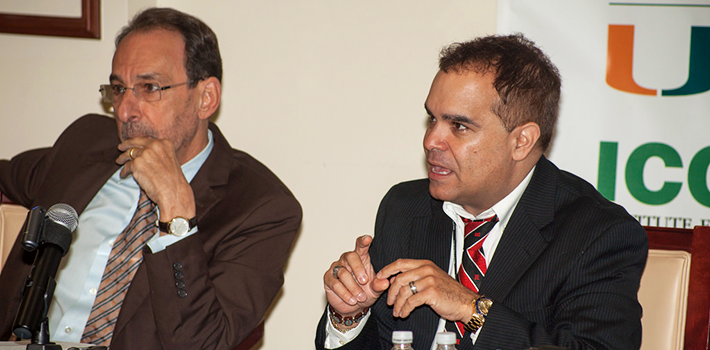EspañolSix years after Raul Castro’s expansion of self-employment in Cuba — an effort to grow the rag-doll economy — and today, it continues to wear rags.

“Raul Castro’s idea of resolving the economy is to go back to the model of 1968,” said panelist Frank Calzon, executive director of the Center for a Free Cuba, referring to a model that Fidel Castro eradicated in 1968. At that time, Cubans could work small jobs, as shoe-shiners or fruit salesmen, for example.
“That level of the economy is a joke,” he said.
Such was the consensus on Saturday, during the first part of a seminar about Cuba’s current status, organized by the University of Miami’s Institute for Cuban and Cuban American Studies (ICCAS).
In addition to Calzon, the first panel, which focused on the current economic issues of the island, featured Mario Gonzalez-Corzo, a Cuban-born professor at the City University of New York and Carlos Quijano, a retired senior consultant to the World Bank. The panel was moderated by José Azel, a senior research associate with ICCAS.

Gonzalez-Corzo highlighted Cuba’s employment shift, saying that even though the government has expanded the possible self-employment activities, there has been a general decline in a total employment. The state sector has had the greatest loss, cutting payrolls by 500,000.
Quijano said that Venezuela, dubbed “the pimp state,” earlier by Gonzalez-Corzo, is the biggest source of foreign investment in Cuba, and that the island cannot afford to lose its beneficial relationship with the South American nation.
Gonzalez-Corzo ended by saying that the business climate is still hostile, despite the apparent progressiveness of Raul Castro’s government.
“This inner contradiction of reform socialism, if we can call it that, where the state is ambivalent in terms of their policies, is a love-hate affair towards the emerging sector,” he said.
The politics panel that followed was moderated by Brian Latell, a senior research associate at ICCAS, and featured Juan Antonio Blanco, executive director of the Center for Latin American & Caribbean Initiatives at Miami Dade College, Marifeli Perez-Stable, a professor at Florida International University, and Pedro Roig, former director of Radio Martí and now a senior research associate at ICCAS.
Latell opened by saying that he believed social stability was higher now in the island than ever before, which makes mass exodus like the one that followed the fall of the Soviet Union, less likely.
Blanco followed by setting up a gloomy outlook on what Cuba is today.
“It is a poor, technologically backward country, located at the margins of the new digital age of globalization and knowledge economies,” he said.
He added that the island has the worst internet speed in the world, after the Mayotte Islands; its market and political institutions are among the five worst of the hemisphere; and to make it all worse, 30,000 people are leaving every year.
“The main aspiration of most Cubans is to live in a modern, prosperous, open society and the main goal for the Cuban elite is to ensure the capacity to remain in power,” he said. “These goals are not compatible.”
Roig focused on the military and the future for the island.
“I used to be very optimistic about the future of Cuba, now I am in the group of the pessimists,” he said.
Roig spoke about the younger generation of Cubans taking over the aging military oligarchy, and he explained that the Castro family has made sure their newer generations occupy the governing spheres.
He continued to address the presence of the Cubans in Venezuela.
“The presence of the Cubans in Venezuela is a major one with over 7,000 troops, besides the thousands of doctors and others in Venezuela,” he said.
“They are well trained, and they will fight to preserve their presence as much as they can, which makes the Venezuelan situation very dangerous for freedom.”
He spoke of the comfortable byproduct of Cuba’s relationship with Venezuela.
“There is no other country in this planet that will bring 10 billion dollars a year to the Cuban economy,” he said.
“This amount of money, if it is cut, it will create a huge problem to an economy that is already in a very tough situation.”
Roig concluded by saying that he still harbors a small hope of seeing change in the island, but he knows that it will not come without the collaboration of the army.
“The Cuban army, especially with that generation, could become like the Spanish army that was a pivot of Spain’s movement into democracy,” he said.
“I hope it can become true because I don’t see any movement in Cuba, a real, open one, without the participation of the army.”
 Versión Español
Versión Español












